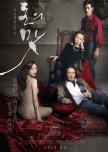
The focus on the absolutist self-image of the Jaeboel changes towards their very human weaknesses
"The Taste of Money" from 2012 bombards the audience with aestheticized images, a strangely bizarre stirring mixture of cynical decadence, insatiable greed and human weaknesses that even the richest of the rich don't stop at. Let's start with the moral of the story: money doesn't buy happiness. On the contrary. The more there is, the unhappier their owners get. They may be wealthy bank-wise, but humanly they are bankrupt. Maybe they can buy anything, but in fact they are (and remain) alone. Their relationships tend to be abusive, mostly cold, and rather an empty, highly polished shell.The KMovie focuses on a Jaebeol clan with a CEO, his wife, daughter and son, as well as the CEO's assistant and a filipino housekeeper.
----------- SIDE NOTE: --- Jaebeol, the secretive modern royalty of South Korea ---
The rich and powerful of South Korea emerged as a distinct variety in the post-war years. As a motor of progress and prosperity, they still influence social life as a matter of course - hidden, unofficially, from the background. In their hands gigantic possessions are concentrated. These are consistently maintained within the founding families. The Jaebeol clans were created as part of the autocratic governance of the early decades of the Republic and were further strengthened during the military dictatorship. The founders set the course for the economic upswing. In the meantime however they behave like the country's new nobility. They shamelessly and ruthlessly buy and bribe people at will. The remaining 99 percent of society are practically 'learned helpless' at their mercy. You have nothing to oppose to this power, which simply interferes with the legislature, judiciary and executive if necessary.
---------------------------------------------------------------------------------------------------
The protagonist's family is one of the first percent of the social class, which behaves as a matter of course as royal families. Here pomp, decadence, coolness, distance, and even obscenity dominate. The highly polished, stylized aesthetic stands in deliberate contrast to a rather gloomy lighting mood. The opulent wealth almost builds an aesthetic wall that cannot be penetrated. The family members are trapped inside. Nothing can or event likes to really approach that, let alone penetrate it. It is (and remains) a strangely strange world.
The idiosyncratic cinematic narrative style contributes to this. It doesn't even try to collect all the threads at the end and close them neatly. It's as if the camera jumped in on the family story at one random point and got off at another. At the beginning, the focus is on the corrupt machinations and the almost absolutist self-image, but that changes on the track after the very human weaknesses of the individual clan members open up. Although they pretend to be untouchable, they are still vulnerable and actually want to be touched. From there it becomes a more or less satisfactory settlement with their own heart balance. 'Love' is a concept in this world that doesn't really want to fit in.
One of the key scenes: Youn Yuh-jung is shown a 64-year-old woman in an unusual candid sex scene. A disturbing effect is deliberately wanted. In a way, this encounter between young and old, between boss and employee, points out the dilemma of the story, so to speak. In this short, impressive scene, the venal world of dependencies and emotional states is turned upside down. The rich have everything and yet they don't - there is something they don't have: the feeling of being wanted, desired or even loved for their own sake.
"The Taste of Money" is a somber social study about the 1 percent that sits at the top of South Korea's social pyramid. Once again. There is an astonishing number of such startling studies in the world of film and series. But it seems even more astonishing to me that there are obviously still far from enough of them. Because nonetheless, this 1 percent still sits dazzlingly on its throne and it is still considered highly desirable within South Korean society to get as far up the pyramid as possible...
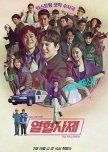
Divine Wrath strikes with unabashed humor, yet healing wounded souls of black, gray + shorn sheep
"The Fiery Priest" is all about Korean humor. You might have to get used to it. At least I did. The first time I approached the series I probably wasn't ready and possibly not in the right mood for such cheerful, tongue-in-cheek fun à la Korean style. I gave up quite early (probably after the first episode). On the second try tough, everything just fell into place. And by now I can say from experience: "The Fiery Priest" is ideal for repeat offenders. I had even more fun then... (And that probably wasn´t the last time I watched...)Nonetheless. Korean humor is special, especially when it comes to the fascination of the intestines - often enough they are gladly celebrated in a wide variety. Here as well. Utter confusion and frenzy are also a must. Instead of tried and tested bar fights and brawls of the western type however, the focus here is rather on choreographed martial arts.
Humor reigns supreme in "The Fiery Priest". Humor determines the pace, the timing, the nuances and the ambience. Slapstick, situation comedy, dialogue jokes, parody, irony - hardly anything is left out. "The Fiery Priest" doesn't take itself too seriously. The central storyline says it all: in the robes of a priest a former NIS agent ensures order and justice. Even the Pope has his brief appearance here. But also the 'sects' with self-appointed saviors flourishing in the country.
And yet, the "The Fiery Priest" has some serious tones to offer, too - besides and in the middle of all the slapstick. The plot background is once again fueled by South Korean backroom liaisons between executive, judiciary, politics and crime. With regard to the personality development of the individual characters, touching emotional moments also come along here and there - comparatively modestly, but nevertheless with impact.
Finally, "The Fiery Priest" also plays out another strength of KDrama: Here you can experience a lot of cheerfully and yet subtly touchingly executed bromance and womance. (However, there's no romance. But nobody has to miss it.) Bromance and womance as well as the variety of embedded side plots inspirit dramaturgical facets, that may touch the heart, having quite something to offer between soft touch and punch. It is simply a pleasure to watch the various dynamic personality developments. (Outstanding actors all along, by the way!)
"The Fiery Priest" spectacularly succeeds in balancing a tightrope act - good-humoredly and mischievously dancing above an unspeakable swamp of injustice, bribery, abuse of power and human greed.
Divine Wrath strikes with unabashed humor, thus along the way healing the wounded souls of the black, gray, and shorn sheep.
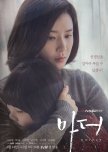
Being a single mother in South Korea can be quite hopeless, that´s where this story is coming from
Yes, you should watch it.As the title suggests, "Mother" deals with the archetypal theme of 'motherhood'. When is a mother a (good) mother? Once a mother = always a mother? Who can become a mother? Who has to be, no matter what? ... So far "Mother" isn't necessarily specific to Korea in terms of its story. (Actually the original is Japanese). But "Mother" is also (and most importantly) about the stigma of single mothers - and for South Korea that is outstandingly detrimental. From this point of view, this KDrama becomes immediately socially critical: if the position of the single mother in South Korea weren't so hopeless, then the whole story wouldn't have developed the emotional drive that it has.
In this context, "Mother" also confronts the viewers with two other socially sensitive issues in their manifold entanglements: child abuse and vigilantism. It is a dramatic fact around the world on the subject of child abuse that dealing with domestic violence is legally difficult. If you go the official route, you can only intervene when it is already too late. In the case of "Mother", essentially almost all mothers featured are to some extend criminals before the law (of one kind or another).
The hearty fare in terms of its sensitive content is, however, in a digestible way illuminated with all the proven stylistic devices of KDrama. The subject is dark and exhausting, but there is still room for light, color, joy and heartwarming in the presentation. Despite all the traumatization, the abused child is primarily a ray of hope (isn´t poetic freedom just wonderful!). It's no surprise that up-and-coming actress Heo Yool was named "Best New Actress" at the 2018 BaekSang Arts Awards... Her play ist simply amazing! (And not just hers...)
"Mother" aired on South Korean television during weekdays at 9:30 p.m. Regarding the scenes about child abuse, the age rating here has been set at 16, as opposed to the more usual 13 years. The KDrama "Mother" was released in 2018. It may be simple coincidence or even correlation: the KDrama just happened to present a burning topic of society at the time: In 2019 there was a change in law, which means that at least abortion now is legally possible for all women in the first 14 weeks without punishment.
-------------------- Side note: --- Orphanage and Single Motherhood in South Korea ---
If you are unmarried and happen to get pregnant, in South Korea you will have a hard time, still today. Exclusion, hostility, mobbing, unemployment, pressure from all sides are not uncommon.
If you are the child of a single mother, trauma of some sort is almost certain - mobbing, devaluation, child abuse, orphanage and/or adoption, you name it.
Noticeably, the 'orphanage' often plays a role for one of the protagonists in KDrama. That's not because it's such a stirring story hook, but because it's a current influence in the lives of many children (and now adults) of South Korean descent. Since the 1950s, the number of officially and unofficially adopted South Korean children, mainly from abroad, is estimated at 150,000 to 200,000. Another global leading position for South Korea... At first there were many war-orphans among them, otherwise there were also children from poor families. But since the 1980s, the main causes have been that the mothers are single parents. Desperate women - for whatever reason single with a child - often have no choice (to give themselves and the child a promising chance in life) than to give the child away - thus giving them a new chance with the option of being adopted to a solid family sooner or later...
For the children in the orphanage, the parents are not necessarily dead. However, their mothers gave up their parenthood at the door for a good reason: because society with its traditional value system does not accept a concept beyond ´traditional´ family. Single parents are not welcome. However, since abortions were also undesirable - i.e. forbidden for ages, unmarried pregnant women always found themselves in great distress... It was only in 2019 that the ban on abortions - that had been in force up to that point - was declared unconstitutional, so that pregnant women are now at least up to the 14th week without specifying abortion without punishment, in the case of rape up to the 24th week.
--------------------
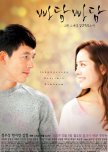
A shining little diamond! An extraordinary masterpiece that touches the heart in more than one way!
For all those who like three-dimensional life in movies and television. For all those who, apart from the clichés, are open to more complex relationships and personal development processes. For all those who want to get involved with a downright hopeless fate at the 'lower' end of the social pyramid. In this context, one should not allow oneself to be driven away immediately by punches and kicking. "Padam Padam... the sound of his heartbeat and hers" rewards with a touching love story that, by Korean standards, takes its place in an almost sensual, sensitive way.I already got to know Jung Woo-sung in "A Moment to Remember" as an exceptional actor, enriching his encounters and relationships with an almost sensual dimension. That alone is a unique feature that contributes enormously to the quality of this KDrama.
Nevertheless, it wouldn't do justice to the story (which is wonderfully told in all instances) to reduce it to just a romance. It tells the story of an ex-con and his fellow inmate. It quickly becomes clear that Yang Kang-chil actually was innocent. And even after his release 13 years later, he is not free from that momentous act that he did not commit. Rather the real perpetrator would like to finally get rid of him for good, as he had witnessed what really happened back then. And others, too, have not forgotten or even forgiven what happened back then.
Kang-chil, on the other hand, would like to make amends for the lifetime that was unjustly stolen from him in prison. He's a simple, uneducated young man, now in his 30s, who only learned crafts in prison. His vita has taught him to engage 100 percent in the NOW. He may seem simple, yet he sees life in simple terms. However, he is quite capable of comprehending, of taking action and responsibility as well. He choses a simple, direct route. If he is happy about something today, then he gives room for this joy TODAY. Not tomorrow. And he doesn't have to weigh up whether it's ok to be happy or not. It's the same with anger. In short: he follows his heart. And there we are with the title of the KDrama: "Padam Padam". As onomatopoeia, it refers to the heartbeat (and takes up the title of a chanson by Edith Piaf of the same name).
------ SIDE NOTE --- Importance of onomatopoeia in the Korean language ---
The title "Padam Padam" also refers to the fact that the so-called onomatopoeia/onomatopoeia is of particular importance in the use of the Korean language - it is about eight times as important as in other languages. In Korean, remarkably often in narratives one can encounter the simple (yet acoustically imitated in a culture-specific way) onomatopoeic imitation of simple natural sounds. The list of everyday onomatopoeic vocabulary is correspondingly long. With this content communication is expressed more directly, more forcefully, more concretely and more immediately. "Padam Padam" therefore not only refers to the heartbeat - symbolic of the life that one wins and loses again, or for the feelings of the two lovers - but also to the special portion of 'directly conveyed, sensually experienceable feelings', which the protagonist places in all of his encounters.
A lot of heart and soul goes into the hand-picked production design, which also mostly wants to leave a consciously direct impression for all senses. (Mainly we are in the rural areas of the coastal region of South Korea.) The landscape, the sunset, the lake at night, the fireworks, etc. impress through a high degree of aestheticization. Sometimes you have the impression that you can literally smell the sweat of the well-trained young men... At other times some scenes are repulsive, ruthless, almost ugly - yet still highly sensual.
So Kang-chil is sensitive, but he's also a tough guy. He's not your usual appealing protagonist. He is peculiar, impetuous, impulsive, irritating, and also disconcerting. But he quickly grows on you in his sincere, direct and sensual way. This is actor Jung Woo-sung at his finest. His female film partner Han Ji-min can't resist the intensity that emanates from him either. It's a pleasure to watch her being drawn into his spell. (Here I can expressly praise the chemistry between the actors...) And then there is Na Moon-hee, who once again embodies the bumpy, complex and yet emotionally real (South Korean) mother-son relationship in a three-dimensional authentic way. By the way, the men here are above all punching, kicking and spitting as if it were the most natural thing in the world. That may be due to the milieu in which the story is set, but not only. Even if it seems strange to the Western eye at times, the KDrama is authentically filled with life throughout.
The story finally offers a not inconsiderable special feature as an encore for its surprising developments away from your ordinary everyday life: a guardian angel (wonderful: Kim Bum with ponytail) .
An extraordinary masterpiece that touches the heart in more than one ways!
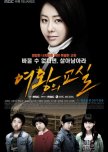
@ mobbing, friendship, class culture and reflecting moral behavior among 6th grade pupils. Great!
"The Queen's Classroom" is a dramaturgically fascinating story about kids at a South Korean elementary school, shortly before their transition to middle school. The young actors are fantastic. Likewise the adults. At the same time, it is a nuanced, clever study of bullying from 2013. I appreciate this series very much because it not only shows THAT there are enormous social problems with an increasingly traumatizing marginalization of young students, but also how/that the school, i.e. the teachers, can contribute in a creative, constructive, pedagogically valuable way, and thus counteract the trend. For this reason alone, "The Queen's Classroom" is worth seeing. In addition, the KDrama tells a wonderful story about the idea of friendship - about how the mere concept and label 'friendship' becomes a real, three-dimensional relationship with a solid grounding. Fabulous.The unique approach is a focus on the age between elementary and middle school - a phase that is crucial in the development of personality, e.g. for the cognitive development with regard to the moral assessment of situations, the ability to change perspective and a differentiated understanding of moral values. Eventually, the moral assessment of mobbing/bullying is the crucial first step in order to seriously counteract the ominous trend. This aspect is a characteristic problem in South Korean schools. (See side note below.)
In the case of "The Queen's Classroom", the homeroom teacher sets important impulses for the personal processes of individual pupils and the class as a whole with quite idiosyncratic, (of course also dramaturgically effective), provocative pedagogical methods. The aim is to use paradoxical intervention in order to trigger more profound emotional and cognitive processes, so that the students can move from the sometimes naive surface of their beliefs to their true, genuine core. On this basis only can they then stand their by all means noble, idealistic convictions powerfully and authentically against adverse circumstances. Personal processes can often be a bit painful, as is the case here. However, the result is quite spectacular for the individuals and for the class as a whole, too. It could/should be something like this or something similar, it HAS to be if the increasing trend of bullying in schools is to change.
Chapeau! "The Queen's Classroom" is boldly leading the way as a small but mighty pioneer in the KDrama world. To be fair, the KDrama is based on a Japanese production. Since the social problem is similar there, it is not surprising. In any case, the Korean remake didn't do any harm... Despite all the emotional seriousness, it's a great pleasure to accompany the kids on their bumpy road.
---------------------------------------
SIDE NOTE: --- Wang-ta - Bullying in a collectivistic society, like South Korea ---
While 'mobbing', strictly speaking, refers to psychological terror or physical violence by a group, 'bullying' describes the harassment itself, regardless of how many people take part in it. However, the choice of term does not change the fact that far too many students are involved - be it as victims, as perpetrators or as spectators/witnesses. This is an international phenomenon, with more or less extreme manifestations. There is peculiarity in South Korea, though: collectivism (vs. Western individualism). When the welfare of the collective has the highest priority, it means that the interests of the individual are subordinated to those of the associated social group - be it family, work, school, class, club, friends, etc. Peer pressure also exists in individualistic Societies, true enough, but in collectivism it has an even stronger impact. This should not be underestimated when dealing with the topic of mobbing/bullying.
'Wang-ta' is a specific, common South Korean slang term that is used in connection with and in dealing with a person who is not part of the group. One becomes an outsider very quickly, wearing the wrong clothes, having the wrong interests or preferences, belonging to the wrong group or to no group, having poor, stigmatized or less influential parents, living in the wrong family constellation or only achieving bad grades. However, this label commonly implies (in collectivist society) that it socially 'is allowed' to devalue and harass this person for being an outsider. When group norms are thus strong, such exclusion based on appearance, lack of achievement, special preferences, etc. can have particularly fatal consequences. Those experiencing 'Wang-ta' first hand, may lack the chance of getting rid of this label again.
- Those who 'choose' the victim are hardly aware of any guilt, since they are convinced, that they are rightly criticizing a deviation from the set norm.
- The other peers will thus avoid the stigmatized pupil and assume that there is something to it, so that the label (and exclusion) is justified.
- And those labeled ´wang-ta´ will only withdraw even further, ashamed of their 'apparent' lack, and feel even more inferior, than they might already do.
Empirical studies in 1998 ff with pupils from European or American countries (with individualistic socialization) showed, that in 85 percent of bullying cases peers were involved as bystanders. Of those, only 11 percent eventually intervened. Unfortunately, I don't have any comparable South Korean numbers, neither from then nor from today. However, I probably don't lean too far out of the window when I suspect that there are significantly less, who would actively intervene.
In the course of further international studies it was possible to prove that intervention by peers is, however, an essential first step towards change. Active intervention on-site in the middle of the situation triggers a (moral) debate among the peers about the situation in the first place. As long as there are only passive, tolerating bystanders, the act is socially approved and its justification defacto confirmed.
There are South Korean studies that show: although the majority of the pupils interviewed do not like bullying, at the same time they also believe that it is inevitable. In fact, they assume, that the victims in general deserve to be punished because of their (self-inflicted) being an outsider.
The peer group has the greatest influence during the school years from late elementary school to high school. At the same time, this is the phase in which generosity in dealing with diversity can and must be learned as an essential social value. If such a value is not socially recognized at that time, then young people will not be able to integrate it into their further lives, let alone apply it. This is the painful crux of the issue of "wang-ta" in South Korean schools (or later in the workplace): generosity in dealing with diversity has no tradition, no culture, no socially recognized value on the peninsula. If you want to change the school bullying trend, then you have to start here. I.e. as a teacher in elementary and middle school, opening up spaces for experience with tolerance and thus creating the opportunity for a new culture of social interaction. A confident class culture that explicitly acknowledges diversity, that socially and openly and explicitly questions wang-ta as a social option, can form the fertile breeding ground for fundamental societal changes that leave more room for individuality. In the face of an ever-approaching, globally networked world, this is becoming increasingly necessary in order to create the personal and social balancing act of a hybrid between traditional and global, between collectivistic and individualistic.
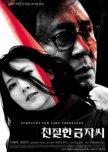
It´s Girl Power time! Outrageous, luminous angelic + consistently deadly, too. Pitch-black humour.
"Sympathy for Lady Vengeance" or in the original "Lovely Geum-ja" is grossly funny, bitterly satirical, with a huge portion of pitch-black, bone-dry, unpredictable humor. The KMovie playfully juggles with details that seem to have sprung from a film noir and, above all, deliberately wants to irritate with the aestheticizing stylization of bloodthirsty revenge.Geum-ja is an Angel of revenge in the most literal sense. Luminous, angelic in her kindness, yet consistently deadly when it comes to her revenge mission. This makes the KMovie a paradoxical, incomparable experience: bizarre, absurd, dark and yet pointedly funny.
It´s is Girl power time! Patriarchy is in the pillory, regarding various offenses and arrogance of most of the male characters. Geum-ja (convincing to the point: Lee Young-ae) offers the entire program of associations with the feminine in its blatant contradictions: saint, whore, witch, as well as mother, lover, friend. Guilty in naive innocence. Outrageous. Diabolical. Sovereign. Powerful. Decided. Efficient. Exhilarated. Significantly, a remix of Vivaldi's "Ah ch'infelice semper" swings the baton in the background.
Storytelling is always close to Geum-ja. Not too much, just as much as is needed, is given to the audience. A serious, deeply meaningful off-screen narrator closes the gaps. As I said, the humor is pitch-black.
By the way, the KMovie (which has also received many international awards) is the third part of a revenge trilogy by director Park Chan-wook, which includes "Oldboy", that is considered one of the most influential films of contemporary South Korean cinema.
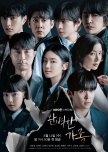
Offbeat! Complex! Intriguing! Not for every taste. Nevertheless, consistent in itself
“Perfect Family” presents itself in the now almost impenetrably dense jungle of the KDrama orbit with an idiosyncratic selectivity. The production, which is carefully selected down to the last detail, contributes to this, as the mimes, music and story are perfectly coordinated and prepared as a splendidly distinctive thriller soufflé. And it is rising so well! Perfect.(I could actually leave it at these words. But for all those for whom that isn't enough...)
The Perfect Family? Does that exist at all? Or isn't that concept made up of a highly controlled lie? Doesn't the control issue inherent in (whatsoever) perfection rob family life of its air to breathe? There are those pretty clean and distinguished in pole position for life. And then there are the ones with the 'loser' card, rather daring and lost, provocatively repulsive. And yet, if you look closely, both are just human beings, with light and dark - neither just saints nor devils.
“Perfect Family” also juggles themes such as friendship and betrayal. (And then there's more to it - but especially with this KDrama, a spoiler would be downright fatal.) In its consistently calm pacing the 12 episodes stroll along by leading us on one wrong track after the other, thus keeping us hooked with our open questions.
Ultimately, the story revolves around what follows a sudden death. At the beginning, together with the young protagonist, we are stumbling from one nightmare of conflicting feelings and confusion into the next. Over time, the confusion seems to clear up. The conflicting feelings, however, remain.
All of this is musically framed by a selected mix of classic classics and plenty of cello, piano, etc. - on top of that there are a few enchantingly soothing songs as a tasty acoustic icing on the cake.
Offbeat! Complex! Intriguing until the end!
In terms of pacing and style ultimately not for every taste, though.
Nevertheless, consistent in itself!
PS:
With a progressive message about the correlation between perfection, family life and authenticity... rounded by the exemplary reflection of when it comes to one's own accountability...
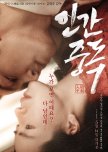
An (erotic) melodrama whose melodramatics were brilliantly captured
"Obsessed" is an erotic movie about a passionate affair in South Korea around 1969. It is a melodrama whose melodramatics were brilliantly captured - with a Song Seung-heon, who absorbs the drama in his particular passionate manner. What is new in that context, is how he is allowed to act almost shamelessly here.However, "Obsessed" is also an exciting KMovie as it touches on a not so well known chapter in recent South Korean history: the time of Vietnam War.
------------------------- SIDE NOTE: --- South Korea and the Vietnam War ---
It is always the USA that come to mind. But South Korea, Australia, New Zealand, Thailand and the Philippines also fought in Vietnam. South Korea was the country most involved after the USA. Between 1964 and 1973, around 48.000 Korean soldiers were each year drafted into this war. They had all volunteered, not least because their monthly wages brought in almost twice as much as a normal annual salary would have at the time. However, the South Korean army has gained a dubious reputation with a few massacres (including among civilians) in this war - a chapter from the time of the military dictatorship that has not been fully processed by now. The KMovie gives at least some space/thinking to this aspect - in connection with the consequences of the post-traumatic disorders, including the protagonist.
-----------------------------------------
"Obsessed" conveys some impressions about those 1960s/70s. The already strictly authoritarian context of South Korean every day life becomes even more so during dictatorship at that time, let alone in military itself. Thus every spark of vitality is nipped in the bud by the stiff corset of an immaculate facade. With the affair, an erotic tension is built up that one is not used to from the KDrama orbit. For the protagonists, however, this tension opens up a forbidden, yet addictive space to breathe, love and feel alive - and this precious moment of feeling alive has more value for the distressed male protagonist than anything else - as he has already seen and brought way too much death into this world...
Provoking. Gloomy. Beautifully done.
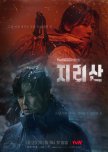
"Jirisan" radiates within the slowed down, yet powerful dynamic of the mountain world
"Jirisan" pays tribute to South Korea's first and largest national park and its rangers, who ensure security and order here. The KDrama weaves an exciting story that also takes into account the special aura of the mountains, adding a good portion of mysticism. Actually Jiri Mountain is quite legendary and downright sacred for Korea. It's worth watching the KDrama for that alone.Other quality guarantees are given by the handpicked cast and high-end production.
A joy for some, a curse for others: "Jirisan" radiates within the slowed down, yet powerful dynamic of the mountain world. The story itself is a bit reminiscent of a mountain hiking tour: it's not a stroll. You need the right footwear. Sometimes you might think you've lost your way. The story is told in several timelines. Yet it chooses its own rhythm with a sure step, that leads to the final destination. On the way it is continuously enriched with worthwhile vistas along the entire route... Fast pace and airy love story are not part of the baggage. But exciting entanglement over time, unconditional trust as a topic in the team of rangers, as well as love in its essential form and various expressions (... e.g. for the mountain).
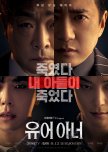
A masterfully done crime thriller, mercilessly progressing offside the beaten track
Fabulous! "Your Honor" is a masterfully done crime thriller, mercilessly progressing offside the beaten track – with an upright protagonist maneuvering himself deeper and deeper into a hopeless fiasco.Right and wrong, black and white – they turn out to be impractical templates. Almost everything and everyone will be turned upside down at some point, and the entanglements will become more and more devastating.
In "Your Honor" suspense isn´t exactly associated with an arc. It is rather smoothly taking one loop after the other. When it comes to the protagonists: it is emotionally intense, yet at the same time controlled to the extreme, calm on the surface, though concentrated to the max. And yes, it is cruel and merciless at (most) times, too. In a dark vesture and at the same time with disarming grace this KDrama is fathoming personal boundaries of what is bearable and often enough even exceeding them.
PS:
“Your Honor” is based on the original series Kvodo by Shlomo Mashiach, for which several international remakes have since been produced.
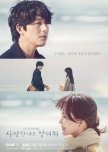
A substantial, mature and exceptionally beautiful love story
For me this is my highlight of 2023.As a phenomenal firework of quiet nuances, “Tell Me That You Love Me” is exuding soulful warmth in graceful silence while creating a soothing atmosphere that takes root deep in the heart. Accompanied by a soundtrack with pulling effect, that could hardly be more harmonious, sincere feelings are conveyed via looks and gestures, while words and thoughts are frequently communicated in sign language, thus telling a story, that knows how to gently touch the audience.
It's not about appearance, facade, coat and make-up, but about essence. Approaching the substantial is exactly what makes this production so exceptional for a KDrama. With Jung Woo-sung, who is once again breathing pure authenticity, certainly a perfect casting for the ML. He also seems to having actually communicated in sign language most of his life. But Shin Hyun-been was also able to effortlessly impress me with her reflected presence. What a couple!
Calm aesthetics and gentle pace intensify the profoundness of the encounters, which opens up spaces for the essential. Even if trenches between the worlds of the hearing and the deaf may be deep and ample at times, loving encounter is still possible. Even if the feelings for each other may be deep and honest, specific barriers inevitably remain. “Tell Me That You Love Me” is gently approaching the dilemma - a desire to face the challenge with confidence, but on the other hand the fear of failure considering the barriers and therefore wanting to run away.
I´d say, anyone who can open up to this rather idiosyncratic “language” of this KDrama will be rewarded by a substantial, mature and exceptionally beautiful love story.
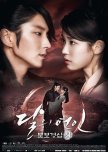
Entertaining, yet rather lightweight. Visually stunning scenes. Emotionally intense at times, too
Frankly, I'm not a fan of shallow, adolescent love stories. (Not necessarily because they are not good, but I guess I am too old by now. The topics are not mine anymore.) I'm interested in somewhat more complex, mature characters and differentiated relationship studies - preferably in an distinctive (Korean) context with additional historical, cultural or subcultural insight."Moon Lovers - Scarlet Heart Ryeo" originally goes back to a Chinese story. The movie adaptation was a great success and so here comes a Korean remake - the plot is unceremoniously moved to the Goryeo of the 12th century and a controversial historical ruler is portrayed on that occasion: the 4th son of the founder of the Wang dynasty (who ruled the Goryeo Empire for over 400 years) King Gwangjong, born under the name Wang So (925-975).
----------------------- SIDE NOTE --- King Gwangjong
Some historical sources have led to the interpretation that he was a right-wing tyrant, but more recent evidence suggests that he implemented the major reforms that laid the foundation for a solid kingdom for more than 4 centuries. This character has also appeared several times in KDrama, for example in "Taejo Wanggun" (2000), "The Dawn of the Empire" (2002), "Empress Chunchu" (2009), "Shine or Go Crazy" (2015) or here: "Moon Lovers - Scarlet Heart Ryeo" (2016).
Wang So had three older brothers (Wang Mu, Wang Tae, Wang Yo), 20 half brothers and 7 half sisters. From this, one can firstly see that he was not actually considered for the line of succession, and secondly suspect that King Taejo kept several wives at court. As life goes, all three older brothers died for different reasons and in the end the crown accidentally fell at Wang So's feet.
After a turbulent period of 3 kings in quick succession, King Gwangjong re-established a stable, centralized government with a strong, loyal army and 7 peaceful years before the aristocracy rebelled against his reforms (which came at their expense). One of his innovative reforms concerned slave ownership, which he had officially checked for legality. When in doubt, the slaves became free people and taxpayers (while their former masters began to lose influence...) However, putting down this rebellion of aristocracy earned him the reputation of a bloody tyrant.
Another reform was the introduction of a national civil service examination, which lasted for almost 950 years. This replaced the pure nepotism previously practiced in filling political offices with performance and ability. At the same time he laid the basis for Confucianism as a principle of social order. He also introduced a dress code at court, from which the respective rank could be read from the colors.
King Gwangjong married his half-sister and two nieces. This is unique in Goryeo's history, as it was more common at court to marry outside of the bloodline in order to gain allied lordships. Gwangjong, on the other hand, relied on a strong, purely royal bloodline. After all, he ruled for 26 years and set the course for the next 400 or so.
-----------------------------------------------------
Back to the KDrama. Unfortunately, the plot that was spun around this dazzling historical king and his family is a bit shallow and predictable at times. Sometimes it reminded me of a harmless, colorful teenage boarding school flirtation. (I obviously don't quite correspond to the target age group there...) But then, furthermore, the story offers unexpected depth and emotionally touching scenes, too. After all, it also comes along with some exciting and visually stunning sequences and an atmospheric soundtrack. I initially ended up there for ´actress´ IU in the first place. In fact, I discovered Lee Joon-gi (as Wang So) in this KDrama. In my eyes it is his down-to-earth charisma (and maturity?) that helps to overcome some weaknesses in the script.
An attractive dramaturgically dynamic component is the leap in time, through which the approximately 20-year-old Go Ha-jin (IU) suddenly ends up at the court of the royal Wang family - in the midst of the numerous sons and half-sons of King Teajo... As a woman from the future, she brings fresh air and a cheeky spirit into everyday palace life, which is characterized by distrust and intrigues. The various mothers are prepared to do almost anything in order to secure a royal career for their precious princes. At the same time, the modern Ha-jin in her idiosyncratic way brings the blue blood of the king's sons (some of whom are still quite pubescent) to a boil, thus providing additional competition among the boys on top of the already existing succession rivals ....
A nice, charming, entertaining, but rather lightweight KDrama-tour into Korean history.
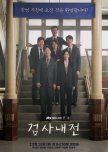
Authentic! The people, the stories, the setting. Affectionate, humorous & true to life characters
"Diary of a Prosecutor" is an extremely delightful, unconventional and, despite all the sometimes snappy, sometimes cheerful, sometimes pitch black, sometimes heartful humor, it also offers a quite serious, profound examination of jurisdiction and practically handling the law. This embedded in the simple everyday work-life of ordinary people, told from the perspective of a provincial prosecutor. The script is based on the essay "Civil War Prosecutor", written by a real prosecutor and inspired by his personal experiences.So it is primarily about the everyday life on the office floors and behind the office doors of the public prosecutor's office. First and foremost, this is about profane workdays that often last until late, including dinner and drinks with colleagues. However, this is also about a noble task, the juggling with legal regulations, the ideals of a just society and the diplomatic basics in dealing with superiors in the strict hierarchy from the bottom to the top. And last but not least, this is a potpourri of different individual stories of quite ordinary people who face the challenges of their inconspicuous lives every day anew, and eventually grow from them - as it is in life...
In other words, you get: a variety of people you grow fond of as you get to know them better; a job-portrait that is subject to the highest expectations, but whose credibility in the country is still not easy. And a (fictional) outskirts - a town at the seaside, famous for its oyster harvest. The filming took place in Tonyeong-si in the very south of the country, where practically the entire crew (around 150 people, including cast) stayed during the five-month shooting period... Provincial life is thus breathing from every pore of the KDrama - everything is a bit more relaxed, closer to nature. Seoul is far away…
Conclusion: Authentic! The people, the stories, the setting. The dramaturgical 'trick': the greater narrative of the omniscient narrator. The humor that comes along with it. Sometimes ironic, sometimes satirical, sometimes bone dry. Bottom line: funny and complex at the same time. Affectionate, humorous and true to life personality portraits. In script and play. The cases and the ethical questions involved go deep at times. And yet it is people who deal with it. Colleagues. Eventually in competition at times. Imperfect people, with weaknesses, even if they wear robes. Yet, people who can excel themselves at times, too. Other than that, the days, weeks, months and years go by, case after case, team dinner after team dinner...
As far as Korean life and culture is concerned, with this KDrama you can get pretty close to the people and their everyday world in many ways. Because of this and a wonderful overall concept, whose good spirit works on all scales, I consider “Diary of a Prosecutor” highly valuable.
Maybe it's a bit unusual at first. Don't let it irritate you. Keep going. I´d say it is worth it...

When is a woman beautiful? When is she not (anymore)? What does it mean for love? For work?
"She was Pretty" is a true story, so they say. It's about love - of course. The first love, too. And about being a woman in South Korea. When is a woman beautiful? And when is she not (anymore)? And what does that mean for her then? For love? For work? For social life? For your self-esteem?That's what this KDrama is about.
Wanting to be beautiful as a woman is widespread. Needing to be beautiful as a woman is deeply Korean. In hardly any other country do women spend so much time on skin care and make-up. Impeccability of the personality is reflected (in the South Korean self-image) in the form of pure skin and so facial care is part of a comprehensive ideal of beauty. The KBeauty industry supplies innovative products for this. In Germany, there are an average of three to five care steps that women use for their facial care. South Korea has become known for its "10-step Korean Skincare Routine", which (should) lead to a flawless porcelain complexion in lengthy and loving detail work.
In my experience, series that deal supposedly critically with ideals of beauty, bullying based on appearance, discrimination based on aesthetic value judgments and norms tend to have a hard time. They can't really be critical since their sponsors often come from the KBeauty industry... And they can rarely present an "ugly", "repulsive" character as a protagonist if they want the viewer to identify with it and actually watch the series. The subject calls for compromises before the story can even be thought through, let alone be told. Most of the time, this results in a transformation process for the protagonist: she transforms into a beauty that men and women can no longer overlook, and as a result she at last gains (now well deserved) self-esteem.
That's why I'm not a fan of this type of series. Even if the actresses are usually very committed, perhaps because the topic is so important to them. But the story can't help it... In the end, the solution is the transformation - the ugly duckling blossoms into a pretty woman and thus causes plenty of "Aha!". That doesn't convince me personally, because the core of the problem is rarely shaken, at most it is touched on the shell.
Accordingly, "She was Pretty" is not among my favorite series. Still I like it. Why? After all, there is the male character of Shin-hyuk. He's a great guy, he's good-looking, he's got what it takes - but he doesn't act like the norm. He takes a close look behind the facades and encounters the human in the woman, not the image of the woman. And falls in love with the woman as she is (before some kind of transformation). I think we need more role models like this. In "She was Pretty" at least there is one. It's encouraging and also fun to watch Shin-huyk (refreshingly played by Choi Si-won) in his encounters with the 'Ugly Duckling'.
Of course, ugly is relative in this KDrama as always. The protagonist, Kim Hye-jin, was once one of the prettiest girls in her class and totally hip. However, she has inherited her father's skin, which is characterized by a noticeable redness in the cheek area. Also, her hair is naturally frizzy. Although this might disturb the eye of the South Korean viewers, it is actually nothing that cannot be remedied with a few interventions, if a woman wanted to. Hye-jin just doesn't want to. To her it's not worth it (also in monetary terms). Yet that's how she offends people and makes social life and professional life difficult.
She compensates for her flaws (and thus her lack of value as a woman) through hard work. At the same time, she and her goodwill constantly invite others to have her be exploited. There's a memorable scene in which she takes on the new job with a competitor. Her co-worker is what you might call pretty (at least she's done a lot to be). As a reward, she is given permission to manicure her nails during working hours and to work rather slowly (if at all). Hye-jin, on the other hand, is passed around, pushed and insulted. The ideal of beauty for women - beyond performance - thus influences hierarchies in the working world. Unfortunately for South Korea this is a widespread status quo.
With Hwang Jung-eum and Choi Si-won being in a cheerful mood and providing plenty of fun in the midst of the actually less funny social conditions, the KDrama becomes worth seeing. The exalted editor-in-chief of the lifestyle magazine, who changes her hair color and her outfit with the hour and constantly recites from Italian operas, also ensures a good mood.
Ah, yes, this Kdrama is first of all a rom(ance) with some com(edy) in search of a happy ending. Some things may be predictable, but some are not.
As far as the beauty-topic ist concerned: It´s never too far from the norm, but some socially critical echoes could still be sprinkled nonchalantly throughout the course of the story. ...Humor paves the way for serious messages...
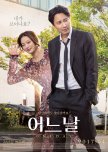
A pleasantly beneficial KMovie infusion. Quiet. Tender. Full of consolation & healing impulse
"One Day" is a beautiful KMovie. Quiet. Tender. Full of consolation and healing impulse. In addition, the story expands the usual dimensions of perception - human being sees ghost; man builds relationship with ghost. The extraordinary situation facilitates extraordinary closeness, opens up new perspectives and allows the male protagonist to look behind the obvious.The female lead character is visually impaired in life, yet specialized in sensing touch instead. The male protagonist, on the other hand, finds himself in a stage of his life, where he prefers to avoid his feelings, because they might overwhelm him. His inability to face the grief over his deceased wife, his feelings of guilt and being lost completely block him. By the way, the female protagonist is also blocked: she is in a coma.
The process of rapprochement between the two triggers a healing process, which is captured tenderly and lovingly, reaching out to the side plots, too. The KMovie knows how to touch. It might come along in an unexcited manner, yet with the perseverance of water, dealing with the stone...
After seeing the movie for the first time, I had no idea what had happened to me. It had pulled me into gentle inebriety. I had actually been sucked in and completely lost the distance.
So I couldn't write anything about it at first. I knew, l would rather want to see it again sometime in the near future. And again, it might not have been my last encounter with “One Day”. Why? Because of the overall gentle tone, the particular radiance, and the unique look&feel of this story. Because it's good.
“One Day” is not a blockbuster, no. However, in my eyes and according to my feeling, it offers a pleasantly beneficial KMovie infusion. (With wonderful acting, too.)


 9
9 38
38 15
15
















